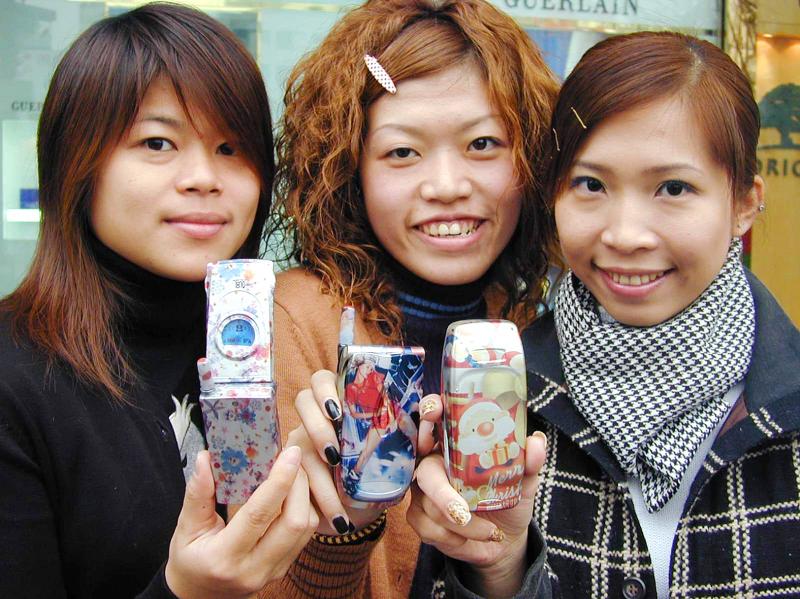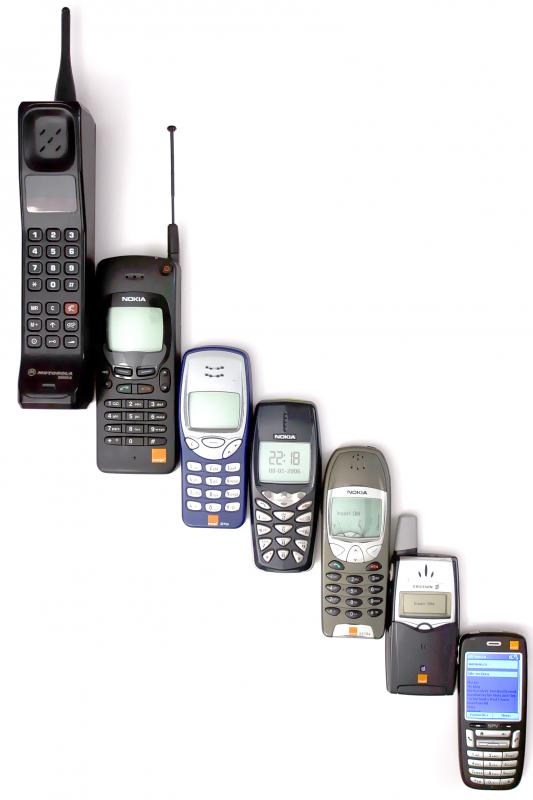Feb. 21 to Feb. 27
By the end of February 2000, Taiwan’s mobile phone users had surpassed those with landlines. It was a quick surge for the industry, as just three years prior the coverage rate was 7 percent, according to the 2001 book Covering the Sky with One Hand: The Telecommunications Wars between the Four Heavenly Kings (隻手遮天: 大哥大四天王的電信大戰) by Peng Shu-fen (彭淑芬).
By the end of 2000, it was at 75 percent.

Photo: Chang Ching-ya, Taipei Times
“Although the battle for the mobile phone market was fierce, compared to other foreign markets, [Taiwan’s] developed quite rationally,” Peng writes. “Unlike Hong Kong, for example, there was no bloody price war with no regard to costs. But even though that didn’t happen here, the competition still greatly drove down phone fees.”
The trigger to these events was the government’s opening of the cell phone market to private operators in 1997. Eight participants entered the initial fray: Far EasTone Telecommunications Co (遠傳), Mobitai Communications Co (東信), Transasia Telecommunications Inc (泛亞), Chung Hwa Telecom Co (中華), KG Telecommunications Co (和信), Tung Jung Telecom (東榮) and Taiwan Mobile Co (台灣大哥大). Tung Jung was the first to fall, bought out by KG in December 1998.
By the time of the book’s writing, Taiwan’s cell phone fees fell to among the lowest in the world. The competition also drove up customer care and service quality, leading Peng to conclude that the consumers were the biggest winners of this war. Peng added that the voice-calling market was saturated, and with the advent of 2.5G Internet the next step would be moving toward data transmission.

Photo courtesy of Wikimedia Commons
EXCLUSIVE COMMODITY
Before 1997, the Directorate General of Telecommunications had a monopoly over phone usage in Taiwan. Cell phones were extremely expensive — one could cost over NT$100,000. Even if you had the cash, there were long lines to obtain a phone number — the waiting list was up to about 1 million people by 1997. If you were desperate, you could buy a number off someone for as much as NT$50,000.
As an alternative, private companies tried to promote the CT2 system, a short-range mobile phone that used terrestrial base stations. People were excited and tempted by the companies’ inflated promises, paying in advance to reserve their spot and even hoping to run their own mini-operation through purchasing a costly personal base station.
This experiment ended in disappointment due to the limited range of the stations (a few hundred meters) and other technical difficulties such as the phone not working if one was moving too quickly. The users quickly returned their devices and the venture crashed.
The government finally passed the Telecommunications Act in July 1996, which aimed to open up the market to private businesses. The Directorate’s sales and business arm was separated into Chunghwa Telecom, with the goal of eventually becoming a private company (it made the transition in 2005).
The race was on. Taiwan Mobile started rolling out deals a month before the market opened, and reportedly had 15,000 customers signed up by opening day. The companies got innovative to compete against each other, offering all sorts of deals, special contracts and putting great effort into advertising.
There was still a gender balance in cell phone use at the beginning. A 1998 report by the Nielsen Corporation showed that 37 percent of men between the ages of 15 and 60 used a cell phone, while only 14 percent women did, although 20 percent expressed a desire to get one soon.
The report also found two main groups of users: those with higher incomes who wore the phone on their waist as a status symbol, and people such as salesmen who actually needed them for their jobs. It added that it would soon tap into the youth market.
Today only three of the original eight remain — Taiwan Mobile purchased Mobitai in 2004 and TransAsia in 2008, while KG was bought out by Far EasTone in 2010.
SHOWING OFF
By the end of February 2000, there were an estimated 12,180,000 cell phone users in Taiwan.
Of course, such a sudden proliferation of the technology brought problems, many of which persist today. Phone etiquette was a big issue, as discussed in the 2000 “Study on Improper Use of Cell Phones in Public Spaces (台灣公共空間內使用大哥大不當行為之探討) by Tseng Shih-yuan (曾士原).
Everyone who had one wanted to show off their new gadget, and they hung them by their waists and talked on them as much and as loud as they could, Tseng writes. It was not uncommon to see people slamming their large, seemingly indestructible phones onto the table as they arrived at a restaurant, yakking on them loudly throughout the course of the meal.
“If talking on the cell phone itself has become a fashionable leisure activity, or an action that one just can’t help showing off to the public, this means that our [already noisy] public spaces will have no chance of becoming quieter.” Tseng writes.
Before authorities clamped down on the practice, phones rang during class, in the library or at movie theaters — one interviewee said that he had heard at least 10 phones ringing during a screening.
This extreme visibility and showing off definitely hastened the popularity of mobile phones, Tseng writes.
“If someone calls you all the time, that suggests that your ability, importance and popularity are top notch,” Tseng writes. “When a cell phone becomes the symbol of how important you are, then even those who don’t actually need cell phones would be eager to have one too.”
Two decades later, this behavior has waned significantly, though it still persists.
Taiwan in Time, a column about Taiwan’s history that is published every Sunday, spotlights important or interesting events around the nation that either have anniversaries this week or are tied to current events.

The 1990s were a turbulent time for the Chinese Nationalist Party’s (KMT) patronage factions. For a look at how they formed, check out the March 2 “Deep Dives.” In the boom years of the 1980s and 1990s the factions amassed fortunes from corruption, access to the levers of local government and prime access to property. They also moved into industries like construction and the gravel business, devastating river ecosystems while the governments they controlled looked the other way. By this period, the factions had largely carved out geographical feifdoms in the local jurisdictions the national KMT restrained them to. For example,

The remains of this Japanese-era trail designed to protect the camphor industry make for a scenic day-hike, a fascinating overnight hike or a challenging multi-day adventure Maolin District (茂林) in Kaohsiung is well known for beautiful roadside scenery, waterfalls, the annual butterfly migration and indigenous culture. A lesser known but worthwhile destination here lies along the very top of the valley: the Liugui Security Path (六龜警備道). This relic of the Japanese era once isolated the Maolin valley from the outside world but now serves to draw tourists in. The path originally ran for about 50km, but not all of this trail is still easily walkable. The nicest section for a simple day hike is the heavily trafficked southern section above Maolin and Wanshan (萬山) villages. Remains of

With over 100 works on display, this is Louise Bourgeois’ first solo show in Taiwan. Visitors are invited to traverse her world of love and hate, vengeance and acceptance, trauma and reconciliation. Dominating the entrance, the nine-foot-tall Crouching Spider (2003) greets visitors. The creature looms behind the glass facade, symbolic protector and gatekeeper to the intimate journey ahead. Bourgeois, best known for her giant spider sculptures, is one of the most influential artist of the twentieth century. Blending vulnerability and defiance through themes of sexuality, trauma and identity, her work reshaped the landscape of contemporary art with fearless honesty. “People are influenced by

Ten years ago, English National Ballet (ENB) premiered Akram Khan’s reimagining of Giselle. It quickly became recognized as a 21st-century masterpiece. Next month, local audiences get their chance to experience it when the company embark on a three-week tour of Taiwan. Former ENB artistic director Tamara Rojo, who commissioned the ballet, believes firmly that if ballet is to remain alive, works have to be revisited and made relevant to audiences of today. Even so, Khan was a bold choice of choreographer. While one of Britain’s foremost choreographers, he had never previously tackled a reimagining of a classical ballet, so Giselle was